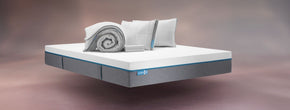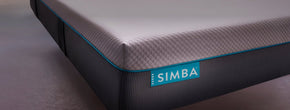How To Sleep With A Cough - Our Top Tips To Get Some Zzzzzzs

Cough and cold season doesn’t just stay for the winter. Whether you’re bunged up on flu before Christmas or coughing through those lighter summer nights, it can be frustrating to be unwell. The secret to getting better, sooner? Rest. But that’s easier said than done when a persistent cough or chest infection keeps you awake.
But why does this happen? Here’s our guide to helping you stop coughing at night. Whatever the season.
Why is a cough worse at night?
The following factors can make a cough worse; -
- Lying down can make the mucus pool in the back of the throat
- A dry, indoor bedroom environment can exacerbate the throat and lungs and trigger a tickly cough
- Your mattress, bedding or carpet contains dust mites or allergens
Best sleeping position to stop coughing?
Adjusting your sleep position can often help relieve a night-time cough.
The best position to sleep in to stop a cough at night is usually on your back with a raised head and neck, anything that helps defy gravity.
Sleeping tips to relieve a cough at night
Use more pillows
Pillows often get depleted over time until they leave you lying at a flatter angle. A horizontal position allows the mucus to collect at the back of the throat and also why your nose and sinus also gets blocked. By adding more pillows to prop your head and shoulders at a 45 degree angle, it will allow the mucus to drain away. Simba’s CustomFlex Pillow features three interchangeable layers for adjustable height, and the Hybrid™ Pillow also features adjustable height and firmness – making them the best pillows for when you have a cough, since you may only need one. Back sleepers who usually use two layers, can use the additional layer to elevate the head and shoulders.
Have a hot drink before bed
If you can’t sleep because you have a dry cough - dehydration can make this worse. A hot drink just before bed can help soothe the throat and help relieve your cough, such as honey and lemon, herbal teas and hot toddies.
Try a steam inhalation
The steam from a hot shower or a bath can help remedy a night cough. Alternatively, you can do a steam inhalation by filling a large bowl with just boiled water, covering your head and bowl with a towel, and taking in large, deep breaths.
Use a humidifier
Dry air can be problematic for persistent coughs. A humidifier can add moisture back into the air space which can help you breathe more easily at night and even help to loosen any congestion. It’s important that you clean and change the filters regularly, as humidifiers can become breeding grounds for bacteria.
Remove any allergens from the bedroom
Dust, pet dander, dust mites and mould can all cause coughs and trigger asthma. If your bedroom is damp with noticeable black or wet patches on the walls, floor or ceiling, try and rectify this situation as soon as possible. Sleeping with pets or letting them sleep on the bed can trigger allergies. Carpets, curtains and bedding can all harbour dust mites. A thorough spring clean may help reduce symptoms, and a mattress cover like the Simba Performance Mattress Protector. Infused with an innovative anti-dust mite treatment, it’s designed to help you sneeze less and sleep more.
Take a night time cough remedy
Tickly coughs can keep you awake at night. Tickly cough syrups can help manage symptoms by soothing the throat with a coating of glycerine, whereas expectorants can help make a cough more productive by loosening the phlegm.
Drink lots of fluids
It’s always a good idea to drink throughout the day, as this can keep bathroom visits during the night to a minimum. Proper hydration can help keep everything lubricated and less prone to irritation.
See your GP
Most coughs last around three to four weeks, but if it’s dragging on much longer, and you can’t sleep because of a cough, it’s always a good idea to get a persistent cough checked out by your GP.
"Perfect mattress! I’ve been sleeping so great since we got it."- Abby L, Hybrid® Mattress
"The mattress and pillows have changed my sleep completely!"-Jonathan L, Hybrid® Pro Mattress















